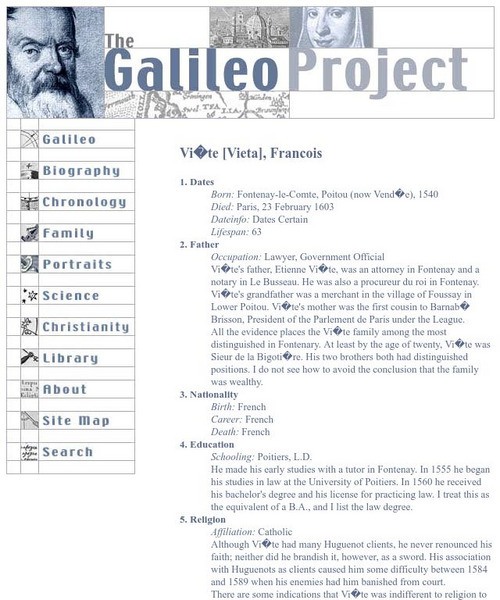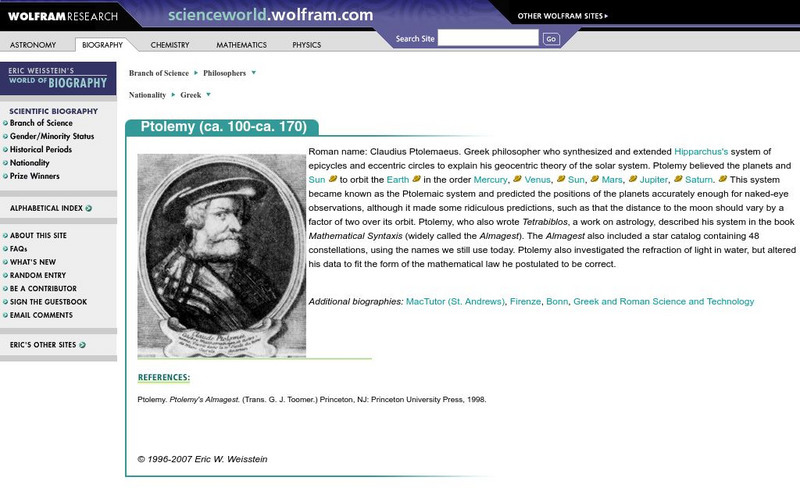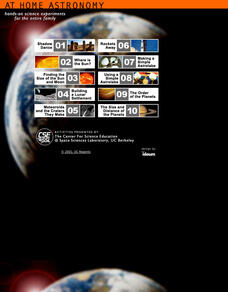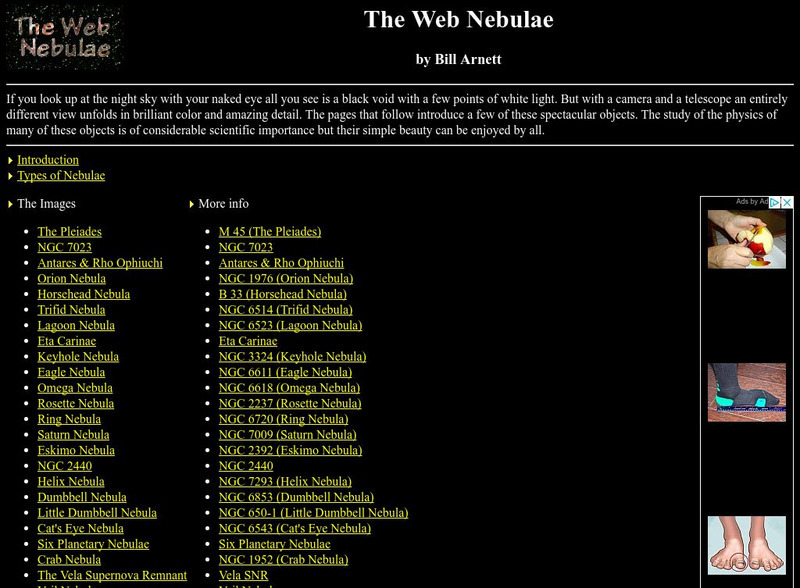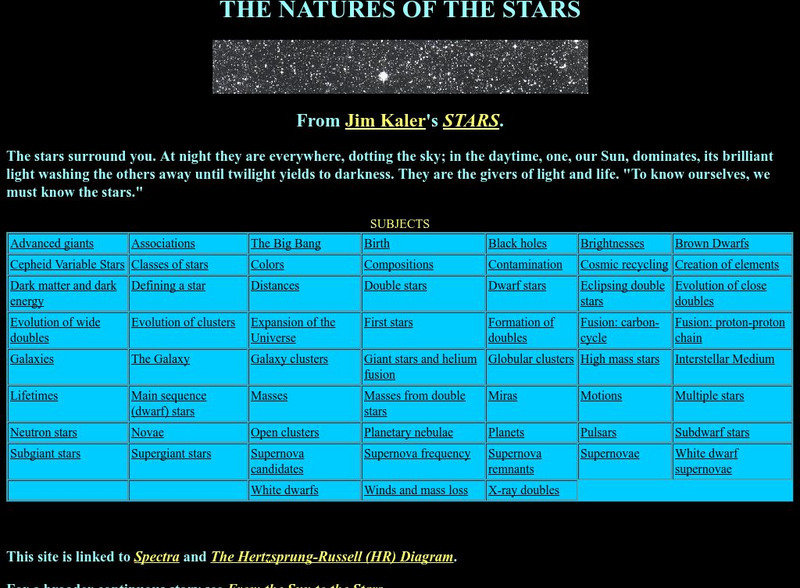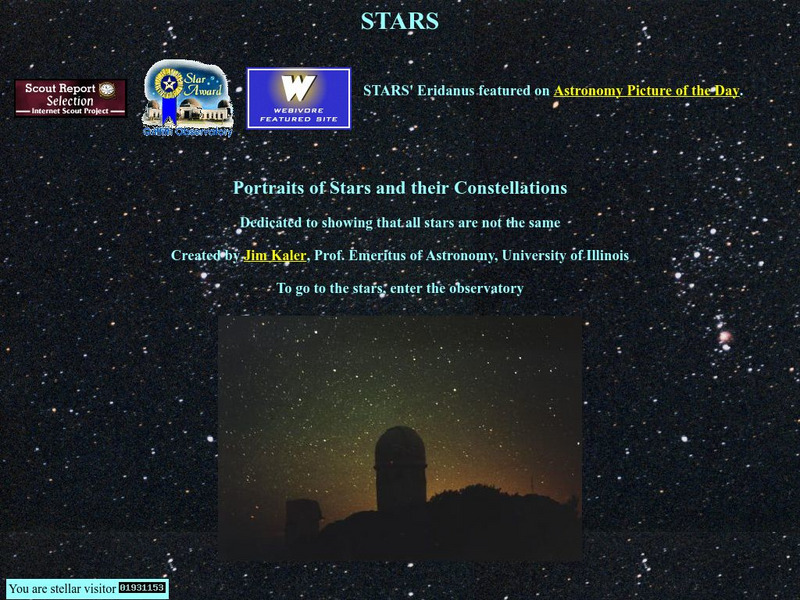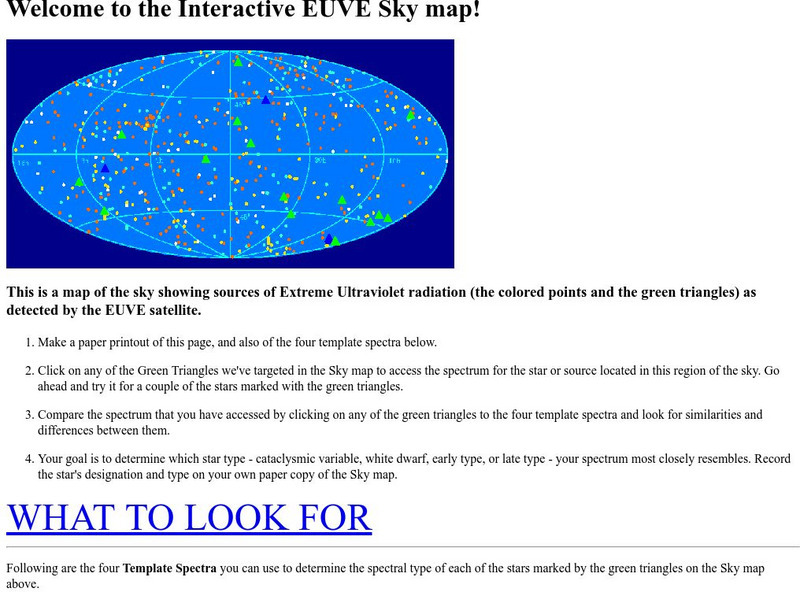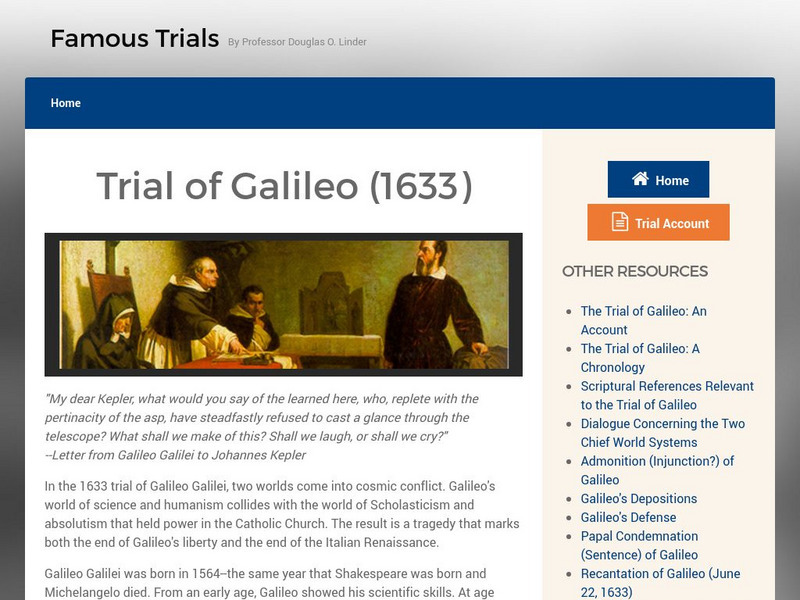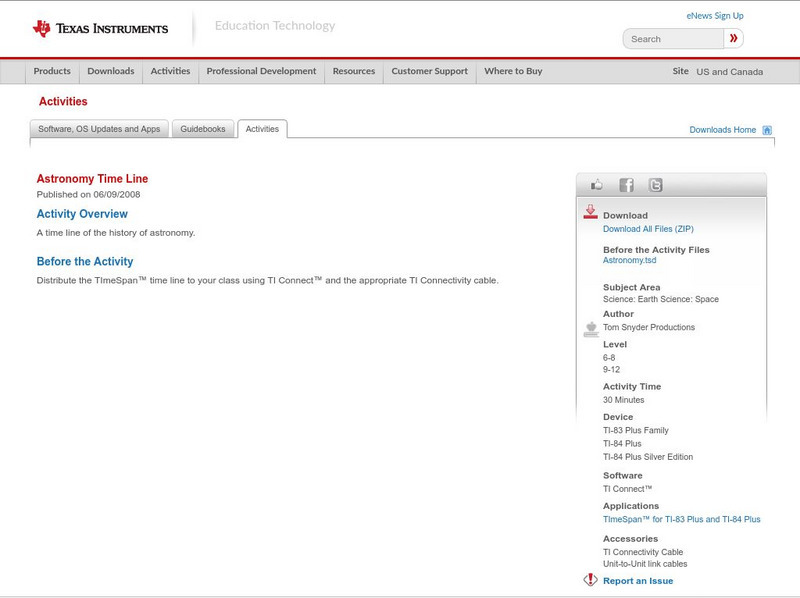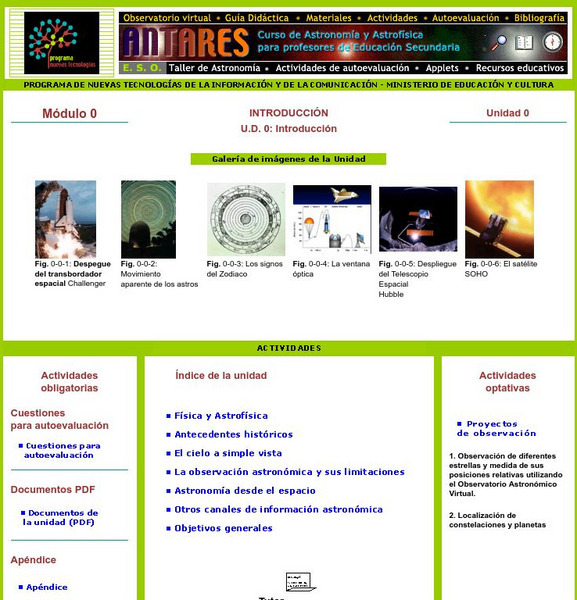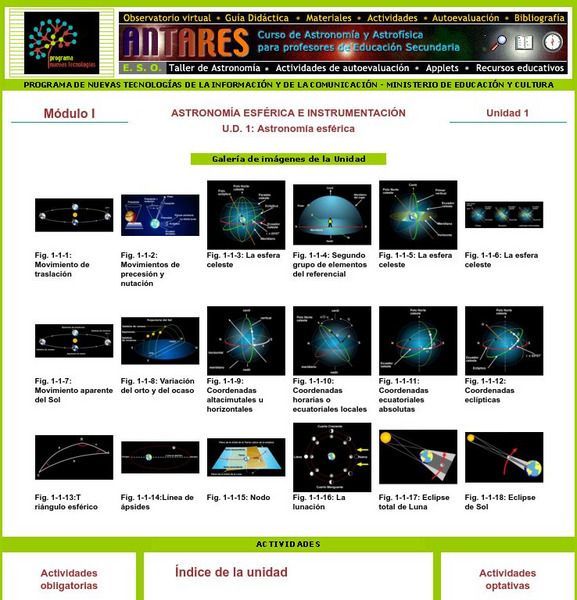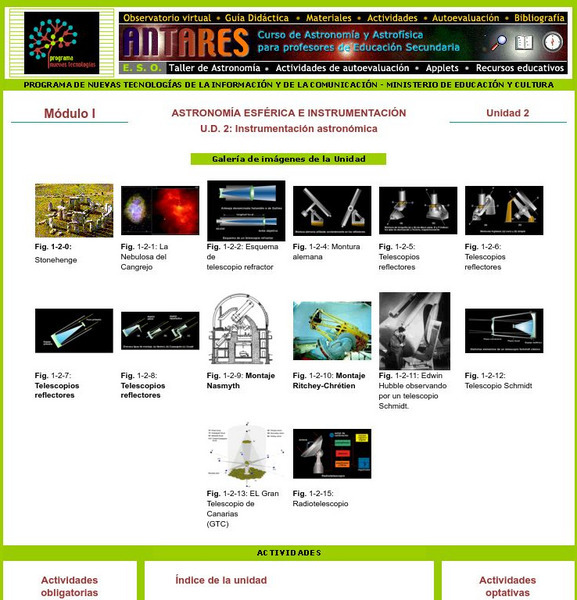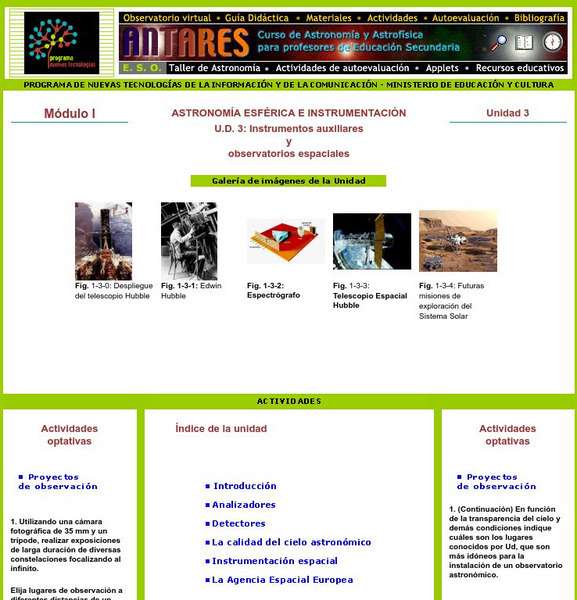Rice University
Galileo Project: Francois Viete
This site from The Galileo Project of Rice University provides a brief overview of Francois Viete, displayed as ten biographical topics. The fields of data collected include topics such as birth/death dates, father, nationality,...
Rice University
Galileo Project: Isaac Newton
This site from the Galileo Project of Rice University is a sort of encyclopedic entry that outlines important information about Newton's life and work. The information is presented in a list format and is worth checking out.
Rice University
Galileo Project: Galileo Galilei
This site from The Galileo Project of Rice University contains information about Galileo's lifespan, father, nationality, education, religion, scientific disciplines, means of patronage, patronage, technological involvement, and...
Rice University
Galileo Project: Christopher Clavius
This site from the Galileo Project of the Rice University provides a biography of Christopher Clavius in list format. The information is medium in length and worth checking out for information on the subject.
Rice University
Galileo Project: The Ptolemaic System
This site from The Galileo Project of Rice University provides this discourse on the Ptolemic System that attempted to explain the motion of heavenly bodies. Pictures, charts, and links are all provided for additional information.
Wolfram Research
Wolfram Science World: Ptolemy (Ca. 100 Ca. 170)
A very brief description of Ptolemy's role in researching astronomy. Links to related information.
University of Virginia
University of Virginia: Lecture on Kepler
The University of Virginia provides a continuation of a lecture given on astronomer Johannes Kepler, this lecture covers his different works within the field of astronomy.
University of California
At Home Astronomy: Hands on Science Experiments for the Entire Family
A collection of ten hands-on science experiments for the entire family that will help you understand concepts in astronomy. Make an astrolabe, find the size of the sun and moon, build a lunar settlement, find out about meteoroids, shadow...
American Museum of Natural History
American Museum of Natural History: O Logy: What's the Big Idea? Astronomy
An introduction to key concepts about the science of astronomy. With interactive flash cards that open in new windows to help you learn more.
Nine Planets
Nine Planets: The Web Nebulae
This site from Nine Planets provides introductory material about nebulae, information and images of several types of nebulae, information on Edwin Hubble, and additional related sites are provided.
University of Illinois
University of Illinois: Stars and Constellations: Neutron Stars and Pulsars
This resource provides a brief description of the relationship between a neutron star and a pulsar. It details the pulsing rate and death of a pulsar.
University of Illinois
University of Illinois: Stars and Constellations
A large collection of information about and photos of the starts and constellations in the sky.
University of Oregon
The Electronic Universe: Ccd Images of Planetary Nebulae
Basic characteristics of planetary nebulae and the relationship to stellar evolution is presented along with many detailed images.
University of California
Interactive Extreme Ultraviolet Skymap
A map showing a view of the night sky is given; sources of extreme ultraviolet light are marked. Visitors analyze the spectrum from these parts of the sky and attempt to determine which star type the spectrum most closely resembles.
Wolfram Research
Wolfram Science World: Copernicus, Nicolaus (1473 1543)
A biography of Nicolaus Copernicus and his contribution to science, specifically astronomy.
University of Missouri
Famous Trials: Trial of Galileo Galilei
This chronicles Galileo's trial for supporting and proving the Copernican view of the solar system. A chronology, biographical information on key figures and pertinent historical documents are available.
Texas Instruments
Texas Instruments: Solar System
This activity is designed to assess the comprehension of concepts related to the planets and other astronomical bodies in the Solar System.
Texas Instruments
Texas Instruments: Space Exploration Time Line
This site provides a time line of the history of space exploration.
Ministerio de Educación (Spain)
Ministerio De Educacion: Introduccion Modulo 0
Observe different stars and measure its relative position utilizing the Virtual Astronomical Observatory.
Ministerio de Educación (Spain)
Ministerio De Educacion: Atronomia Esferica Modulo I Unidad 1
Recognize the major constellations and learn about the sky during the different seasons of the year. You will also be able to measure the height of the mountains of the moon.
Ministerio de Educación (Spain)
Ministerio De Educacion: Instrumentacion Astronomica Modulo I Unidad 2
In this unit you will combine all the major components of a telescope to obtain the desired system for different types of astronomical observations.
Ministerio de Educación (Spain)
Ministerio De Educacion: Instrumentos Auxiliaries Modulo I Unidad 3
In this unit you will learn the main advantages and disadvantages offered by the refractor and reflector telescopes for a particular observation. You will also learn about the main types of telescopes.
Ministerio de Educación (Spain)
Ministerio De Educacion: Diagrama H R Modulo Ii Unidad 3
In this unit you will study the different types of luminosity, the effective temperature of the stars and the Hertzsprung-Russell diagram.


